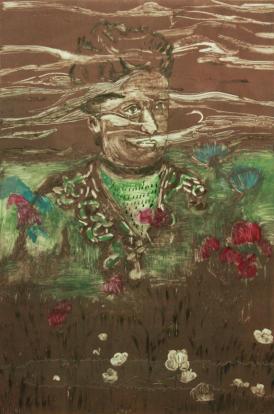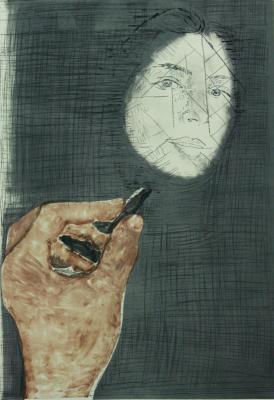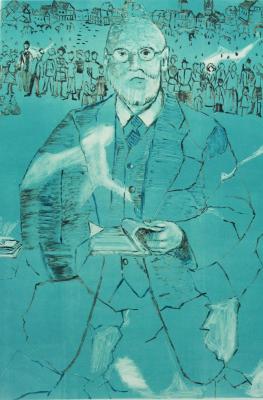By KATHERINE HOLLANDER & ALLA LAZEBNIK
Alla and I were introduced through a project that paired poets and painters affiliated with Boston University. Walking into her studio was like seeing all the things I wish my poems could do in language. We selected my five-poem series, “The Book of Ikons,” to work on together. This series (which also includes poems about Osip Mandelstam and Angelika Balabanoff, both Russian, like Alla), posits as worthy of iconography five historical figures, all of whose relationship with socialism was complicated by Soviet Communism, violence, or anti-semitism (three subjects also important to us). We wanted to explore the faith, hope, disappointment, transcendence and danger inherent in these ideals.
Alla created large-format monoprints, which became the digital images presented here, to be paired with the poems like facing panels in an icon screen. Rather than just creating illustrations, her images interact with and embody the poems. Like iconic images, these figures are idiosyncratic and not wholly accurate (for example, the little story about Kautsky is actually a conflation of several historical incidents). They capture what these figures mean to us, even if they are rooted in a reality that is at least partially imaginary.
*
Ikon for Rosa Luxemburg

When you first crossed the border to Germany
you came covered up, hidden in a wagon like a tumbrel.
That sour little country, still the hope of your Europe,
where you made an uneasy home, a mouse
in a knife drawer. Sturdy engine, you, squat and self-
sufficient economy, in your good boots with your limp,
the frilled lip of your oyster-shaped hat, your murderous red language:
they killed you in the Eden Hotel and put you
in a river. I want to believe the last words you said
you said in German. I want to have faith you said
Don’t Shoot. But hush now—here you are—
not in prison, weeping over a beaten ox,
not beside yourself in August ’fourteen,
but in the meadow you loved so much,
up to your waist in the deep grass
and wild flowers, your eyes covered
with a bright visor of light.
*
Ikon for Käthe Kollwitz

I can feel your crosshatchings on my body: little
wounds. Ink or charcoal, your black is the black
of the childhood room before sleep. Your whole
world divides into light and shadow, even
your skipping, syncopated name: a child
tripping up the museum steps and then the slow
ponderous gait of the mother behind it.
The hands you render broad as oar blades,
eloquent black mittens with intelligent
knuckles and bright nailbeds. You said “Vote!”
You said “Seed Corn Must Not Be Ground!”
And you showed the faces of the mourners
before the body of Leibknecht. Your son
died in a trench, wretched. In your self portrait
you regard yourself curiously, but without any pity,
cheek in palm. Yet when I look again you have altered,
you have put your face behind your hand,
that dark articulate spade.
*
Ikon for Karl Kautsky

Idea-architect, the red rainbow
flutters behind you like an academic sash.
The sky itself is robin’s egg green and fretted
with cracks. And here you sit in your dark suit
and neat beard, like a good scholar.
Like a good scholar, you were hopeful
but you knew when the truth had to be faced.
Your eyes are formal and sad. One of them
sees revolution. The other sees the day after revolution.
You know you see neither in Russia.
You know that whatever it is you want
for the people, violence unfits them for it.
Your third eye, which no one can see, looks out anxiously
as you wait by the coffee pot for the last two men
of German social democracy to come home
from their walk. You are right to be worried.
They are picking off your friends one
by one. A whole constellation of stars put out,
fondest uncle—singly at first, and then all at once.
Katherine Hollander is a poet and doctoral candidate in modern European history at Boston University.
Alla Lazebnik is a figurative painter and printmaker.



